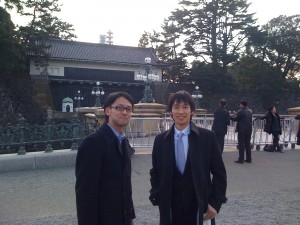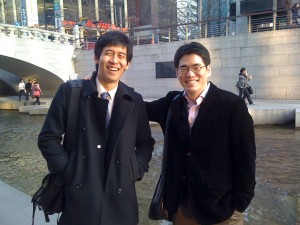Today I put this up on the Huffington Post and thought it might also be of interest for readers of this blog:
This week political science professor Gerard Alexander hit a chord (or was it a nerve?) with his Washington Post essay on “why liberals are so condescending.” Despite the recent successes of the Tea Party movement, Scott Brown, and a filibuster-happy Senate, Alexander repeats the old refrain: We conservatives get no respect. Rather than enjoy the intellectual disarray of the Left, Alexander seems to long for recognition from his liberal colleagues: You liberals think you have all the answers, and you never listen to us conservative voices, no matter how much education we have! Although many have recognized that the conservative movement did become “the party of ideas,” Alexander complains, liberals still see the Right as mired in false consciousness, hypocrisy, or both. What’s a faculty member got to do to earn some credibility? Publishing a provocative lecture for the American Enterprise Institute in the Washington Post isn’t a bad start.
But is the Left really more condescending than the Right? When Sarah Palin mocks Obama’s supporters with “How’s that hope, change thing working out for yaw?” is that not a form of condescension? Palin’s populist condescension toward those who don’t live in “the real America” pales before the patrician variety famously mastered by William F. Buckley. Woe to the liberals who carelessly strayed into his firing line. Two examples can stand for dozens of great zingers: “I won’t insult your intelligence by suggesting that you really believe what you just said,” Buckley sneered. “Liberals claim to want to give a hearing to other views,” he observed, “but then are shocked and offended to discover that there are other views.” Alexander cites Paul Krugman as a prime offender of looking down his nose at conservatives, but why is this any different than Chicago-school economist Eugene Fama saying “My attitude is this, if you are getting attacked by Paul Krugman, you must be doing something right”?
No, liberals have no monopoly on condescension or intellectual and social smugness. Mocking people who drive Priuses (it used to be Volvos) is just as common as sneering at people in supersized pickups. But there does seem to be an easy association between elitism and progressivism that conservatives are able to reactivate at the drop of a hat. Why do we jump at the accusation? Is it because condescension is indeed a temptation for a politics that depends so much on education and on faith in the powers of knowledge? Liberals prize education – valuing it as a vehicle toward a more just and hospitable world. Education means enlightenment, which Kant famously defined as “freedom from self-imposed immaturity.” Confidence in the power of education can lead to arrogance because people in the know feel that they ought to be able to fix things. As people pursue education, they often feel that they are leaving false beliefs behind, that they are becoming freer as their illusions and dependence are dissolved. As this happens, many look around and see others who haven’t yet shed their old ways of thinking and are still mired in falsehood or reliance on authority. “I used to think like that, too,” says the advanced student to the frosh, “but now I know better.” This is what Eric Voegeli [it’s actually William, see comments below] was getting at when he wrote last year’s version of the condescension essay, “The Roots of Liberal Condescension,” published in the Claremont Review of Books (and found on the Wall Street Journal online). “Thus, if patriotism is the last refuge of a scoundrel,” he wrote, “snobbery is the last refuge of the liberal-arts major.”
Does education necessarily breed elitism and condescension, and does it necessarily give rise to political liberalism? A little education very well might promote the intellectual arrogance many conservatives see in their caricature of a professor on the Left, but liberal learning is, after all, supposed to make us aware of how little we know. That’s what Socratic insight is all about: we need to learn because we understand so little. Education should lead to intellectual humility as we become more aware of our own ignorance. Conservatives also prize education, after all, but they do so because it should deliver the lesson of intellectual humility. Education should prevent us from thinking we can solve our deepest problems with science, technology or political structures.
There is a parallel here with faith. Some believers, infused with confidence in their own righteousness, display a spiritual arrogance that is offensive to those who don’t share their beliefs. But many people of faith discover a deep humility through their spiritual life — a humility that leads to openness to others rather than a proud sectarianism.
So maybe condescension depends less on questions of ideology, learning and faith than it does on differences in character. Some people just find it easier to sneer at others rather than to try to understand people with different points of view. The satisfactions of condescension are a temptation for people who feel they already know so much, just as the pleasures of elitism are seductive for people who are certain that God is on their side.
It’s always easier to be condescending when you don’t spend time with people who think or live differently than you do. That’s why it’s so important to find possibilities for dialogue that cut across ways of thinking or modes of belief. Political diversity is crucial for universities, for example, because if we live in an echo chamber of the Left, then we will forget how much we can learn from conservative thinkers who have rightly questioned our ability to master public and private life through systems of knowledge or government. Diversity of belief is good for all of us because if we think that we live in a community of the righteous, we might forget our responsibilities to those whose different beliefs and practices give meaning and value to their lives.
As a teacher and president of a university, I remain committed to education as an antidote to elitism rather than as a progressive cultivation of snobbery. As we learn, as we become more aware of our own ignorance, we should also become more open toward others, toward what they have to teach us. Looking down on others is surely a sign of intellectual fear rather than of a willingness to learn. An education in the liberal arts, which can lead to a political position on the Left or the Right, should result not in condescension but in its opposite: respect.
[tags]Huffington Post, journal article, Gerard Alexander, politics, Eric Voegeli[/tags]





